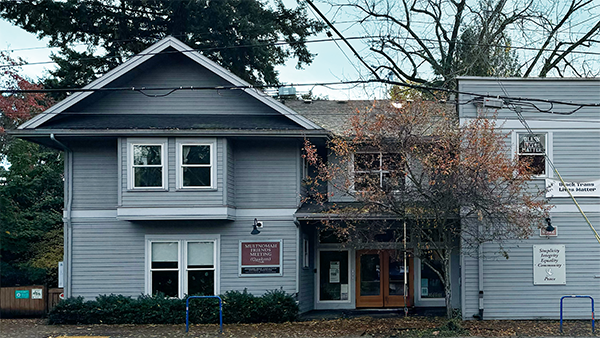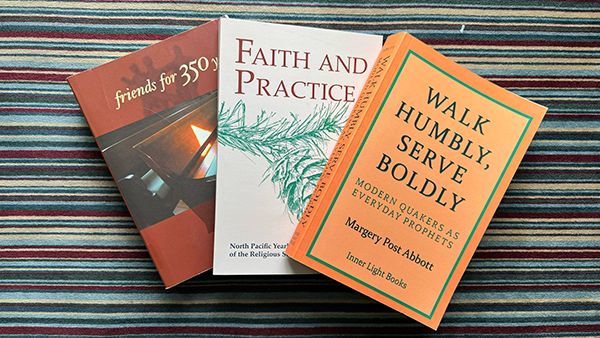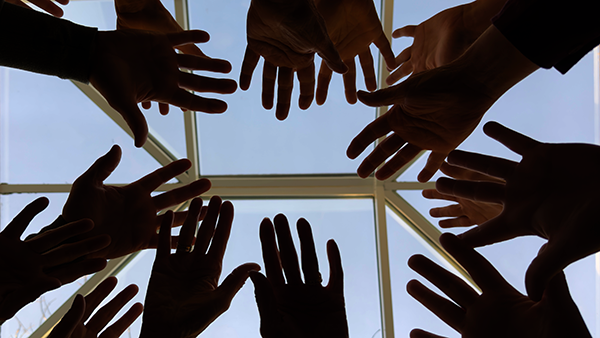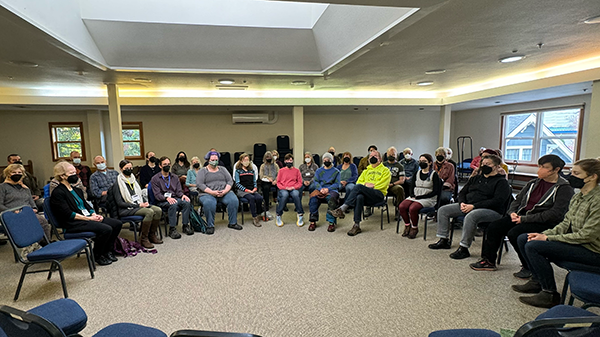Palestine Israel Network at Multnomah Friends Meeting
Multnomah Friends Meeting Minute on the Holy Land
In February of 2019, this meeting approved a minute affirming our support for a just peace with respect and equal human rights for all parties in the Holy Land. The minute reads:
Multnomah Monthly Meeting of the Religious Society of Friends (Quakers) holds Palestinians and Israelis both together in our hearts and prayers. Because our Quaker spiritual values and heritage affirm that of God in everyone, we seek to engage in meaningful solutions for a just peace with respect and equal human rights for all parties in the Holy Land and loving cooperation between both peoples. We seek the guidance of the Spirit in our work to end racism in our own community and country and to carry out our Testimony of Peace in relation to the United States government policies which impact the conflict in Palestine/Israel. We commit to take actions, in a spirit of nonviolence and reconciliation, to further peacemaking between Palestine and Israel.
The Quaker Palestine Israel Network (QPIN), under the care of the Peace and Social Concerns Committee at Multnomah Friends, meets on the first Sunday of each month at noon, to support this minute by:
- Praying for peace and holding both Palestinians and Israelis in the Light.
- Educating ourselves about events in Palestine and Israel, as well as the history of the conflict.
- Planning actions, including demonstrations and boycotts.
- Identifying and creating ways to educate others.
- Communicating our views with elected representatives.
More About What We Do:
- Boycott, Divest and Sanction (BDS) Action to Boycott Pillsbury Products
- Why Do Friends join with QPIN?
- Actions You Can Take on Your Own
- Actions One Can Take In Our Meeting
- Work with QPIN and other meetings and organizations on campaigns
- Links of Interest
- Palestine-Israel Action Resources
- Palestine Israel 101
Boycott, Divest and Sanction (BDS) Action to Boycott Pillsbury Products
At the February 2022 Monthly Meeting for Worship for Business, the following minute was approved.
As members of the justice-seeking Multnomah Friends Meeting, we believe that the General Mills/ plant, owned and operated by the Israeli company Shalgal Ltd. on Palestinian land occupied by Israel, should stop producing Pillsbury products at this site. This factory is located in an illegal settlement.
In support of this we are asking the Meeting to support our call for a boycott of Pillsbury products.
- Personal awareness of the boycott and a commitment to boycott all Pillsbury products until General Mills stops producing Pillsbury brand products at this factory in East Jerusalem
- Permission to publicly state that our meeting supports the boycott.
- Support and/or participate in actions QPIN takes regarding the boycott such as leafleting at grocery stores, writing letters to Pillsbury management, and contacting legislators.
Friends join with QPIN because:
Americans are responsible for the suffering and human rights violations because of our government’s:
- financial support of the occupation and blockade,
- political support through not holding the State of Israel accountable for its human rights violations in the UN and Washington, and
- funding and supplying of American weapons and equipment used to bomb and kill civilians and destroy their homes.
Changing US public opinion is required to ultimately change the situation on the ground.
Quakers have been working for peace, freedom, human rights, and justice in Israel-Palestine since before Israel was created.
By working together we can be more effective.
Actions You Can Take on Your Own
- Write to newspapers and media
- Talk about Israel/Palestine with friends and Friends.
- Join the Peace and Social Justice/Concerns Committee to work for justice in Israel/Palestine.
- Link with another pro-human rights Friend for joint projects.
- Reach out to Friends in the Yearly Meeting to spread the word or do a presentation.
- Contact legislators to end financial, military, and political support for Israeli repression.
- Add an intersectional signature line to your emails (i.e. “Palestinians, like Navajo, Cherokees and others, have been displaced by settler colonialism.”)
Actions One Can Take In Our Meeting
- Education:
Organize an informational session before or after meeting for worship or during the week.
Host movie nights
- Take a stand:
Create minutes and work for their adoption.
Create or go to protests
Work with other groups
Work with QPIN and other meetings and organizations on campaigns such as:
HR 2590 US Congresswoman Betty McCollum’s bill Defending the Human Rights of Palestinian Children & Families Living Under Israeli Military Occupation Act. There is good info at mccollum.house.gov . Read the text of the bill at HR 2590 This bill prohibits the use of funds from the US ($3.8 billion per year) to be used to arrest and detain children and for the destruction of Palestinian homes.
No Way To Treat a Child The No Way to Treat a Child campaign seeks to challenge and end Israel’s military occupation of Palestinians by exposing widespread and systematic ill-treatment of Palestinian children in the Israeli military detention system. We demand an end to Israeli military detention and prosecution of Palestinian children in Israeli military courts. It is a joint project of Defense for Children International – Palestine and American Friends Service Committee. It is active in the United States, the United Kingdom, and Canada.
BDS – Boycott, Divestment, Sanctions The Boycott, Divestment, Sanctions (BDS) movement works to end international support for Israel’s oppression of Palestinians and pressure Israel to comply with international law. Learn more about it at https://bdsmovement.net
Know What to Boycott. We focus on companies that play a clear and direct role in Israel’s crimes and where we think we can have an impact. You can find a list of companies to boycott at https://bdsmovement.net/get-involved/what-to-boycott
More resources: QPIN answers to BDS critics – Engaging Critics of BDS – A Resource for Activists
Boycott, Divestment, and Sanctions? Pendle Hill Pamphlet 445
Ending police militarization The Deadly Exchange
One of the most dangerous places where state violence in the U.S. and Israel converge is in exchange programs that bring together police, ICE, border patrol, and FBI from the US with soldiers, police, border agents, etc. from Israel. In these programs, “worst practices” are shared to promote and extend discriminatory and repressive policing in both countries. These include racial profiling, massive spying and surveillance, deportation and detention, and attacks on human rights defenders.
- If Americans Knew Great website with up to date information.
- JVP Israeli-Palestinan Conflict Palestine Israel 101 from Jewish Voice for Peace
- Teach Palestine Resources to teach others about the situation
- Quaker Palestine Israel Network
- AFSC Justice in Palestine and Israel
- No Way To Treat a Child Arrest and Detention of Children by the Israeli Military, also HR 2590
- The Deadly Exchange Training of US police departments by Israeli Military
Palestine-Israel Action Resources:
- Mazin Qumsiyeh’s list of 70 Ways to act for peace with justice (what YOU can do) and his Activist’s Manual
- List of recommended movies for Meeting movie nights
- List of recommended video clips
- List of recommended webinars
- “Demilitarize!” — an AFSC publication; Stop Israeli military training of U.S. police.
- QPIN answers to BDS critics – Engaging Critics of BDS – A Resource for Activists
- Boycott, Divestment, and Sanctions? Pendle Hill Pamphlet 445
- Blog by Palestine Israel Action Group (PIAG), a subcommittee of the Peace and Social Concerns Committee of Ann Arbor Friends Meeting. Includes:
- A JVP explanation of Zionism vs. anti-Semitism, including a short Israel/Zion history.
- 10 BDS criticisms and responses.
- An example of a BDS Action: Friends Fiduciary
News Resources:
Webinars:
- How to have conversations on Israel with others: US Boats to Gaza
Books:
- Beyond the Two-State Solution: Jonathan Kuttab. Breakthrough book on line.
- How I Learned to Speak Israel – An American’s Guide to a Foreign Policy Language: Alex McDonald (of QPIN). A story of conversion from believing in the Israel myths including history that is rarely shared in the U.S. and details of what is happening on the ground.
- When They Speak Israel – A Guide to Clarity in Conversations about Israel: Alex McDonald. A reference guide for how to have conversations with people who believe in Zionist myths. An excellent reference with recommendations for how to respond to hasbara expressions like “Don’t you believe Israel has a right to exist,” “Criticism of Israel is anti-Semitic,” etc.
- Book reviews and articles on Palestine from Friends Journal
Palestine Israel 101
Adapted from the Institute of Middle East Understanding (IMEU)’s background briefings.
Q: What is the Palestinian-Israeli conflict really about?
A: The Palestinian-Israeli conflict is, in essence, a conflict over territory. Although religion plays a role in defining the identities of the parties to the conflict, and for some Jews, in justifying their claims to the land, the conflict is not, fundamentally, a religious conflict.
Q: What exactly is “the occupation”?
A: In 1967, Israel defeated the neighboring Arab countries in a war that lasted only six days. At the end of that war, Israel had captured the West Bank (which includes the Eastern half of Jerusalem), the Gaza Strip and the Golan Heights. (It also captured the Sinai Peninsula, but this was later returned to Egypt as part of a peace accord that holds to this day). Some of this territory was annexed, specifically the Golan Heights and East Jerusalem.
The rest of the West Bank and the Gaza Strip has been under a military occupation ever since. This means that the Israeli army has complete control over these areas. Palestinians in these regions have no guarantee of civil rights. They have no government of their own other than what Israel will allow. Israel can impose total curfews on any part or all of the territory. This prevents people from traveling to work, to market or to see family members. It can prevent medical care from reaching people, and people from reaching hospitals.
Occupation means the Israeli military has total authority over every aspect of Palestinian life. In addition, Israel has settled hundreds of thousands of its own citizens in these lands, in defiance of international law.
Q: Are Palestinian and Jewish citizens of Israel treated equally?
A: No. Although Palestinian citizens of Israel are entitled to vote and participate in Israeli political life, and several Palestinians are members of the Knesset (the Israeli parliament), they do not receive the same treatment as the Jewish citizens at the hands of the government. Israel still applies 20 laws that privilege Jews over Arabs. For example, the 1950 Law of Return grants automatic citizenship rights to Jews from anywhere in the world upon request, while denying that same right to Palestinians. The Basic Law of Human Dignity and Freedom ensures that Israel is the state of the “Jewish people,” not its citizens. This law was passed in 1992 to serve as a “bill of rights,” as Israel does not have a written constitution.
Israel’s flag and other national symbols are Jewish religious symbols, not neutral or national ones that represent all the citizens of the state. Government resources, meanwhile, are disproportionately directed to Jews and not to Arabs, one factor in causing the Palestinians of Israel to suffer the lowest living standards in Israeli society by all economic indicators.
Human Rights Watch has compiled an extensive study of Israel’s policy of “separate, not equal” schools for Palestinian children, finding that “Government-run Arab schools are a world apart from government-run Jewish schools. In virtually every respect, Palestinian Arab children get an education inferior to that of Jewish children, and their relatively poor performance in school reflects this.”
As many as 100 Palestinian villages in Israel, many of which pre-date the founding of the state, are not recognized by the Israeli government, and are not listed on maps and receive no services (water, electricity, sanitation, roads, etc.) from the government. More than 70,000 Palestinians live in these unrecognized villages. Meanwhile, hundreds of new Jewish towns have been established on lands confiscated from Palestinians.
Q: Did the PLO reject a “generous offer” for peace at Camp David in 2000?
A: No. In fact, there was no Israeli “offer” at all, in the sense of a comprehensive plan to resolve all outstanding differences between the parties. To the extent that Israeli positions on discrete issues could be discerned, they were not “generous.” Finally, while Palestinian negotiators did not agree to Israeli demands, they did not “reject” them, but sought to continue negotiations, and offered solutions based on long-accepted principles of international law and justice.
Q: What is an intifada?
A: Intifada is an Arabic word derived from a verb meaning “to shake off,” and is the term used to describe the two major uprisings against Israeli military occupation of the West Bank and Gaza Strip.
Q: Haven’t Jews and Arabs been fighting for thousands of years? Is there really an answer?
A: In fact, Jews and Arabs have been fighting for only about a century. While Jews were facing repeated expulsion and persecution in Europe, Jews in the Muslim world, though still facing some problems, were faring much better. Jews, as People of the Book under Islamic law, were entitled to legal protections and certain rights. To be sure, they were not the equals of Muslims, and there were incidents of anti-Semitism in many parts of the Muslim and Arab world through the centuries, some of them serious. But both the severity and the frequency of these were far lower than in Europe.
There is no doubt that the ongoing and brutal conflict between Israel and the Palestinians, as well as the neighboring Arab states, has created a great deal of hatred on both sides. But it is simply false to say that history shows that Jews and Arabs cannot live together. They have before, and, in a modern, secular state, may well be able to do so on a much more equal footing than existed in the past.
Q: What do Palestinians seek?
A: Palestinians, depending on where they live, face different challenges and thus have different concerns. However, what they all have in common is a basic desire for freedom and equal rights.
Palestinians living in Israel seek rights that are equal to Jewish citizens of the state. Palestinians living in the West Bank and Gaza Strip seek an end to the Israeli military’s domination of every aspect of their daily lives – whether through direct military occupation, as in the West Bank, or control from without, as in the case of the Gaza Strip – and rights to freedom and national self-determination, equal to those of other national groups. And Palestinian refugees and others living in exile want the right to return to their homes, if they so desire, or to receive compensation and support for resettlement, just like other refugee populations in the world.
Q: What was the Gaza disengagement, and how has it affected Palestinians?
A: The Gaza disengagement was part of a unilateral plan adopted by the Israeli government without consultation with the Palestinians, although with the approval of the U.S. government. The disengagement began in August 2005, when Israel evacuated approximately 8,500 civilians from 21 settlements in the Gaza Strip, and 500 more from four small settlements in the northern part of the West Bank – about 2% of the total number of Israeli settlers in the Palestinian territories.
Israeli troops began to deploy outside of the Gaza Strip, while still controlling its coastline, borders, and airspace. Israel continues to provide Gaza water, electricity, and other vital services. Israel also claims the right to intervene militarily, including preemptively, in “self-defense.”
In a sense, this represents a change in the form of military occupation from direct to indirect control. Dov Weisglass, a close adviser of Prime Minister Ariel Sharon, stated in an interview with the newspaper Ha’aretz in October 2004 that the plan was intended to put the peace process in “formaldehyde,” to postpone the creation of a Palestinian state indefinitely, and to relieve pressure on Israel to make further withdrawals from the West Bank
Many Palestinians see the Gaza disengagement and the intensification of colonization of the West Bank as two faces of a unified policy whereby Israel will rid itself of responsibility for Palestinians, while maximizing its control of their land.
Q: What is Israel’s separation wall or barrier?
A: In October 2003, Israel began construction on a “separation barrier” in the occupied West Bank, justifying it on security grounds. The barrier consists, in places, of a wall twenty-five feet high, razor wire, trenches, sniper towers, electrified fences, military roads, electronic surveillance, and buffer zones that sometimes reach 100 meters in width. Much of the wall will be built on lands confiscated from Palestinian landowners within the West Bank – not within Israel’s own territory. Many Palestinian homes, business, orchards, and other valuable assets in the route of the wall have been destroyed.
The wall has been challenged repeatedly before the Israeli High Court, which has several times ordered the military to re-route specific sections of the wall, although the court has held that a wall built on Palestinian lands does not, in principle, violate international law. However, the wall must be militarily justified and conform to the principle of “proportionality” (that is, that the burdens imposed on civilians are proportional to the security benefits achieved through the military’s action).
The wall was also the subject of a case before the International Court of Justice. The ICJ ruling, announced in July 2004, held that the wall is illegal, must be dismantled, and ordered Israel to compensate Palestinians damaged by the wall’s construction. It also called upon third-party states to ensure Israel’s compliance with the judgment. Although an advisory opinion, and therefore not binding on the parties, the ICJ judgment is an authoritative statement of the status of the wall in international law. In the course of the opinion, all fifteen judges of the court found Israeli settlements in the Occupied Territories, including East Jerusalem, to violate international law.
The wall has become the focus of weekly protests across the West Bank over the last five years. Led by Palestinians, these protests have used nonviolent techniques like sit-ins and roadblocks and have drawn increasing support from Israelis and internationals.;
Q: What happened during Israel’s 2008 invasion of Gaza?
A: According to the Goldstone Report, and corroborated by Israeli and international human rights groups, the Israel Defense Force (IDF) and Palestinian armed groups had committed war crimes and possibly crimes against humanity. While the report condemned violations by both sides, it clearly differentiated between the moral and legal severity of the violations of the Israeli forces compared to those of Hamas and other less culpable Palestinian armed groups. “The following grave breaches of the Fourth Geneva Convention were committed by Israeli forces in Gaza: willful killing, torture or inhuman treatment, willfully causing great suffering or serious injury to body or health, and extensive destruction of property, not justified by military necessity and carried out unlawfully and wantonly. As grave breaches these acts give rise to individual criminal responsibility



